Home | City Notes | Restaurant Guide | Galleries | Site Map | Search | Contact
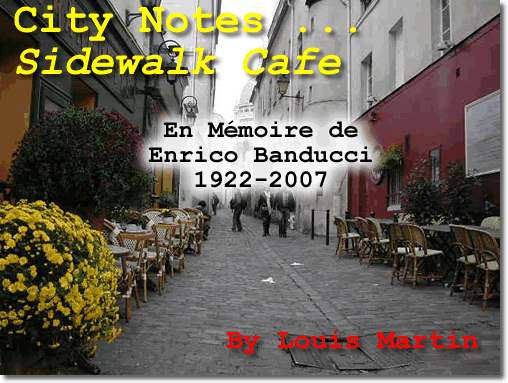
Paris—October 28, 2007
"How was Paris?"
I could hear Jen's question even before I'm off the plane in San Francisco. She's was picking me up at the airport. I probably should have refused her offer but hadn't.
"Paris is Paris," I would say, delaying the answer for awhile.
But I can hear the response to that:
"Paris is Paris? That's all you've got to say?"
"It is a mixture of all the species," I would then say, hoping to delay things, "it is a chaos, a throng where everybody hunts for pleasure and hardly anybody finds it, at least so far as I could see."
"That doesn't sound like you. Who wrote that? It's eloquent; you're not."
I was stung by the insensitivity of her remark. But she was right.
"Voltaire," I confess.
"Voltaire?"
"Yes, Voltaire. I had a drink at his old hangout, Le Procope. Even shot a photo of his writing table.
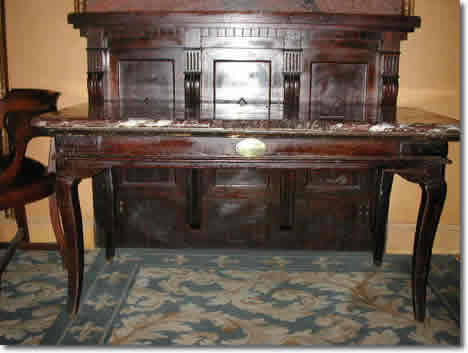
Ben Franklin used to hang out there too, and in more recent times ..."
'HOW WAS IT?"
Jen is only into the present. I hesitate, then say:
"A mix. Paris is a mix."
I hear her sad reply:
"You're kidding. I thought Paris was supposed to be fabulous. My friend Ronnie went with there with her new boyfriend and said it was ..."
"That's probably because she was on vacation there, or her new beau is a fabulous lover. She wasn't actually living there."
"A mix? Bud, you disappoint me. I thought you were a writer. Writers are supposed to ..."
"Sorry," I cut in, "but that's the way it was. Writers are also supposed to be honest."
This stopped her. I don't think she is fond of honesty.
"Well, what did you do there?" she finally asks.
"I listened to music, I ate at little cafes, or tried to when the French didn't get in my way, I went to parks, I shopped ..."
"The French got in your way?" she asked sarcastically.
"Yes, sometimes they did," I said.
"Well, tell me about the music," she said.
"On September 29th I dropped by ..."
"I don't need dates. Just tell me about the music."
Jen is a recruiter for one of those big silicon valley companies in California. One of her pet peeves is resumes without dates. I once explained to her that people don't want to list dates on their resumes because it reveals their age and they don't want to be discriminated against on that basis, but she just sneered at me, as if to say that wasn't possible at her company. Jen is quickly becoming one of my pet peeves. She's out of touch with reality but thinks she owns it.
But back to the music. I might tell her something like this:
I dropped by Autour De Midi on a Saturday night to hear Christine Flowers. She's a singer from New York who lives in Paris. She was there with Jacobi LE MASON on piano, Christian BRUN on guitar, and Arnold MOUEZA on percussion. I like Christine because she is a gutsy jazz singer who connects with the audience. Others try to connect, she does. Autour de Midi is located on Rue Lepic in the center of Montmartre. Jazz takes place in the cave, Cave a Jazz, below. Caves are popular for jazz in Paris. I think they make performers and audience alike feel like outcasts. I guess that is a kind of good feeling these days. They used to torture people in caves. I don't know where they do it these days.
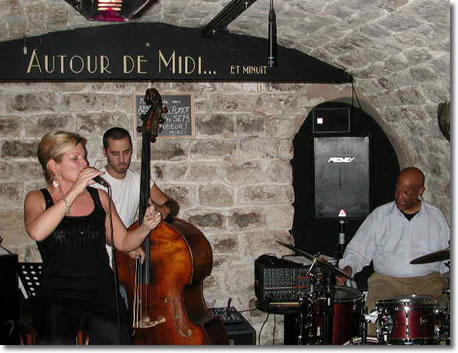
"Who cares where it is located?" I could hear Jen screech. I would ignore her and give the cross streets and metro information.
The next week I went over to Théâtre de la Reine Blanche to hear Stéphane Cadé. He was there with Adrian Tranquant and others. He opened strongly with the theme song from his CD Série Rose, but I did not stay the whole time, as I wasn't feeling well. But it was an interesting walk over to the theatre from my place on Rue Labat, in central of Montmartre, to east Montmartre across the railroad tracks. This is a largely African part of Montmartre that does not appear in the picture postcards of Paris. The weather was fine but I don't recollect any trees on Rue Marx Dormoy. I do recollect some trash on the street that had not been picked up. No one bothered me; I'm used to walking in the Tenderloin in San Francisco.
"But what about the music?" I can hear Jen ask. "I'm not interested in dirty streets. There are dirty streets right here in San Francisco."
J'avais
cassé ma mine
Et le soleil
Taillait son crayon noir
Dans mon oreille ...
What about the music? You have to hear it. They first played what I call a kind of rock-chanson style. It is French chanson with rock-influenced instrumentation. Guitar, drums ... Then they moved closer together and switched over to less conventional instruments, one with keyboard and a long tube that was blown into, and for me the music became unique. I first ran into Stephane Cade at Living B'Art, then over at Au Limonaire, all different kinds of places. Now he has shown me the other side of Montmartre. Theatre de la Reine Blanche means Theater of the White Queen but there is nothing royal or queenly about it any more.
The next day I ran into another act that I've seen before but with slightly different players. It was Hot Papaz over at Le Houdon Jazz Club. Hot Papaz is not something you eat but rather a person and the center of the group. You can read about him here. I missed not hearing Philippe de Preissac, who was with the group the last time I heard it. He seemed to be replaced by a tap dancer and a trombone. But I guess I'm lucky to have heard the group at all. One unfortunate thing that is happening to live jazz in Paris is that it is getting preempted by rugby whenever there is a game. I'm not quite sure how you can call yourself a jazz club if rugby determines programming. Are you really a sports bar? That is what such a place is called in the San Francisco, where there is no shortage of bars with wide-screen TVs. But in San Francisco a sport bar does not try to be a jazz club and visa versa. The two don't mix. Le Houdon is not the only one playing this game. Until the rugby season is over, don't expect too much jazz in Paris.
Maybe Autour De Midi does it right. They don't mix. They simply wait until the rugby season is over. In fact, the next week I caught the William Chabbey Trio at Cave a Jazz, and clearly jazz was in full season there. This modern cave was full of fans who stayed for both sets.
Music, however, peaked for me a week later with a performance by TAKE 3 at Le Houdon. At first I thought their pianist was nuts. I didn't get what he and they were doing. On the second number I got it. They bill themselves as a trio très atypique and indeed they are. They are dramatic, poetic, like cabaret performers, and simply do nothing in the usual way. The pianist, Rémi Toulon, who I believe is the leader ot TAKE 3, is the main instigator of the rebellion, the principal insurgent. Of course, if you want to go against the grain, you have to be good at it, but he is or they are. He's or they're. Break it up; any other way, Monsieur noluoT.
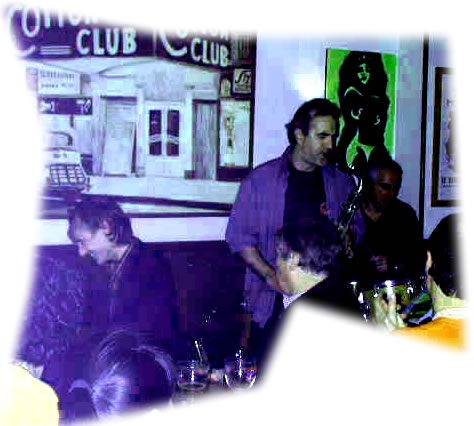
The next night I went back to hear Agathe Sahraqui, who was billed as a chanteuse in the style of Billie Holiday, but she was bumped from the lineup by rugby. Now would Billie Holiday have allowed herself to be bumped like that? I don't think so, and therefore concluded that Agathe was not a very good imitator and that I hadn't missed much. But, oh, Paris, what have you come to? One big sports bar ruled by the pretzel baron?
"But what about the restaurants?" I can hear Jen, or someone else, asking.
"Restaurants? A mix," I say.
I wait for the shocked look to disappear.
"But Marilyn and Bill said ..."
"They were probably on vacation. Maybe they were even in love. Do people in love taste what they are eating? Are they insulted by bad service?"
I explain.
I am now beginning to have good experiences in restaurants but at the beginning I was not. I was running into what I call "language accidents" where I would say one thing and the wait person would hear something else. The most common accident I had was in ordering a glass of wine. Sounds simple, right? There is vin blanc and vin rouge. But I would say vin rouge and the wait person would hear vin banc. Why? I'm not quite sure. I can only guess that because rouge was not pronounced with a perfectly rolled r, they guessed that I must be saying blanc. Reasonable? Not exactly. Does blanc sound anything like rouge? If you had to take a guess, would you guess blanc or rouge. I would guess rouge but a French person would apparently guess blanc. Actually, I guess there is a certain logic there. If rouge lanc does not sound like rouge to you, try the other possibility, blanc. Now I could have ordered blanc when I really wanted rouge, and visa versa, and things might have been okay, but I chose instead to work on my pronunciation.
Then if things got really bad, your wait person would start speaking to you in English. I simply hated them for that. Insulting? Yes. With all my "investment" in the French language, in its irregular verb forms and in knowing what long stings of letters went completely unpronounced, I was being treated like scum, like a common foreigner! I would not take it. So I developed this little routine.
"Je ne parle pas l'anglais. Parlez-vous allemand? Catalan?"
This snapped them back into French.
I had many little "accidents" of this type, finally culminating in un accident de grande. Late one night, coming back from somewhere, I stopped by Le Halle du Sacre Cœur. I asked the waiter, "Avez-vous Lillet." I like the stuff. It is a wine aperitif from Bordeaux.
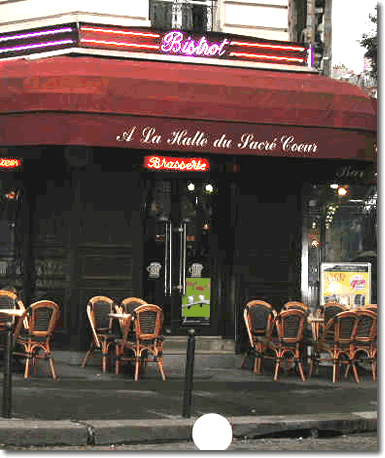
The waiter gave me a slightly quizzical look, and said, "Qui monsieur. Chaud ou froid?"
"Froid" (cold) "et avec les glaçons." (Cold and with ice.)
I thought I saw his eyebrows raise a bit with the request for ice.
Now the chaud ou froid question might have been a tip off to me but it wasn't.
Soon a nice big glass of milk arrived. On the rocks, of course.
Hmm. What sounds like Lillet? Le lait, or milk. And, no, he wasn't making fun of me. He thought that is what I wanted. I think occasionally they have a customer drop by who has been out drinking all day and needs something to comfort the stomach.
So the next time I order this drink I will add clarifying words:
"Avez-vous l'apéritif de vin de Bordeaux que l'on appelle Lillet?" Or something like that.
"Very funny," I hear someone saying, "but how was the food?"
"So-so," I say, "I'm not really sure."
"You don't know?"
"I still have things to learn," I say.
I had one of the worst meals in my life, which you can read about here. It came with pretty good service, however. I also had some of the worst service in my life, in three cases coming with no food at all. Let me explain.
Sunday is perhaps a poor time to go out alone to eat. Places are packed with weekend folks and tourists trying to cram every bit of pleasure into their lives before returning to the dull routine of the week. But I did it anyway. I had been working hard myself and felt like I deserved something good to eat. I was rewarding myself like a dog. Big mistake. Reward dogs for tricks. Not yourself.
Earlier in the week I had spotted a place that looked kind of good. You know, small, good bar, lots of people there. Lots of people is usually a good sign; no one is definitely a bad sign. So I headed up toward the place, Café Arrosé on Rue Custine.
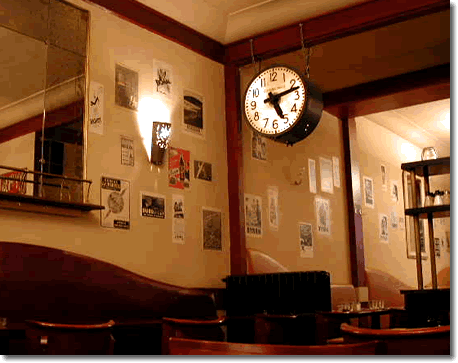
I was cheerful, happy, relaxed; I may have also been whistling a happy tune. Unfortunately, when I got there the place was closed. In Paris it's sometimes hard to know if a place is going to be open or closed. In San Francisco you know; restaurants have hours. In Paris, restaurants have moods; or rather, their owners or managers have moods. If they feel it is a good day to be open, they are open; if not, they stay closed. Or that is the best I can make of it, anyway.
But I was undaunted by this one little obstacle to obtaining my reward. I headed over to La Butte, a place that always seems busy and therefore, I concluded, must be good. I plunk myself down at a table that a waiter has been cleaning. I get out Le Monde to occupy myself while I'm waiting for him to return and finish cleaning the table. There are a few pieces of lettuce on it and still a knife or a fork. He doesn't come back. Five, ten minutes go by. I move to a table inside that, due to its location, surely must get service. The waiter is back now outside taking an order. He comes back but passes my table. There is another young woman, a waitress, I presume, standing over by the bar. She continues to stand idly by. Do I detect a smile on her face, an evil grin? I think I do. I wait another five minutes or so. No one comes by. Have I done something wrong. Am I "weird" in some way I don't know about? I don't think so. I am alone; maybe I don't look local. But I think that is about all. Maybe I'm too polite to say Fuck You Get Over Here Asshole, or some French equivalent. Was this bad service or just no service? I don't know. I leave.
Still hopeful of eating I go down the street to one of the pricier places, Le Cépage Montmartrois. Surely I will be allowed to eat there. They have customers but not so many as the less-expensive places down the street. I find the right table, a small one that is nevertheless on the beaten track of the servers. One comes by, halts. I ask, "Avez vous le menu ?" He sneers and walks off. What is going on here? Is it the accent? Is he coming back? I have no idea. I wait awhile—they are somewhat busy—then leave. Daunted now like a dog that has been whacked with a newspaper for reasons that it does not know—it did not poop in the wrong place, it did not bark at arriving guests—I leave. I try another place. It is not that great looking but in fact I'm hungry by now and a little pissed.
There are only a few customers at the bar. I ask the woman behind the bar:
"Est-ce que possible manger ?"
The woman at the bar smiles and answers in English that they have finished serving.
I hate this. She speaks English when she perfectly well understands my French. I take her smile for a sneer; I think she looks happy that I am hungry. I take a walk. This is one of those absurd situations that can destroy your mood. I relax a little, try to laugh it off but not very successfully. I do find a place that is serving after awhile, but it is little better than a Bob's Big Boy. Service is without a s'il vous plais or a merci; service is silencieuse.
Well, life is like this sometimes. At least I hadn't been blown up by a roadside bomb detonated by children with a cell phone. I would recover.
"That's pretty bad," I hear someone else say. "Why would they treat you like that?"
I have no idea. Maybe the accent. Maybe a busy day. Maybe the fact that I was alone. It's easier to dump on a person who is alone. A couple or a group will fight you. Anyway, things did pick up. This was the worst. But I did sort of give up on restaurants for awhile. I started visiting the magasins de vin, les fromageries, les boulangeries, and eating chez moi.
I have seen plenty of bad service since this but nothing quite like it. I think it boils down to this: Service is included with meals, so tips don't matter. In San Francisco, tips are all-important to a wait person. Hence the service is on a totally different level. Now I hate to hold people hostage over tips, but I equally hate bad or indifferent service.
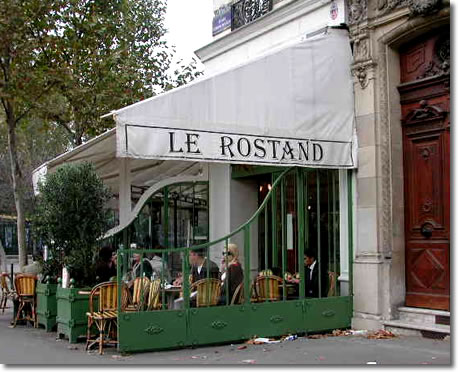
Let me give another example. I was over a Jardin Luxembourg the other day. More on that later. But afterwards I stopped by Le Rostand, a kind of classy little sidewalk cafe across the street. The street tables were crowed and the enclosed area of street tables a little crowded, so I went inside to the main restaurant. It's nice there; you still have a good view of the street. There was only one other person there at a table. I sat down and waited. The waiter walked by repeatedly from the bar to the outside tables without stopping. Finally I see the Matre d' glare at him when he comes back, meaning take care of the gentlemen and the lady. The waiter just sticks up his nose and walks right back outside. I look at the Maitre d', who give me a look that says, what can I do with these young sons of bitches? I then saw him speak to another waiter. Soon that waiter came over to at my table and took my order. He was a nice young man and understood my French, accent and all. Not once did he sneer or switch into English. My wine came soon. A little thereafter the omlette. Both were good. Then I noticed that the waiters wore coats and ties on top but blue jeans down below. The Maitre d' was immaculately dressed. I guess it was hard to get waiters these days; even harder to get them to dress for the job. What had become of the professional waiter? There were some over at Brasserie Lipp. But I was not sure I liked the "professional" waiter that much either.
"And how was the food?" I hear someone else asking.
At Le Rostand, not bad. I had the omlette avec fromage et jambon (cheese and ham) and it was nicely seasoned with herbs. Other places I have had omlettes that were pretty tasteless. But again, it seemed to be formula food. There was nothing original about it. It was the standard French omlette made with slightly more care. Why all the formula food? I have an idea about this.
I have this habit, when going into a restaurant, of trying to get a look into the kitchen. What I often see in Paris these days is one Indian guy doing all the cooking. I can't believe how these guys turn out so many pretty-good plates of food, but unfortunately that is all the plates are: pretty good. I think to cook good French food you need to be French. Or I think it helps. I had an Italian friend in the restaurant business in San Francisco. His name was Maurizio. He now has a restaurant in Michigan. He used to be appalled at the number of Hispanics working in the Italian kitchens of North Beach. "You ask them to do an Alfredo sauce, and sure, they can do it. Ask them to do something else and they have no idea." It was his belief that you had to know a country's culture and its cuisine to cook its food.
I don't totally agree with Maurizo's view of the Hispanic kitchen. Take the case of Café Bastille in San Francisco. There you have executive chef Edgar Sierra from Mexico City who, with the introduction of a little pineapple, a bit of red pepper flakes, maybe even at times a thin slice of jalapeno, lifts formula French "classics" out of the doldrums.
"Well, you don't sound like you like anything," I hear another say.
Not so. I finally found Café Arrosé open and ate there twice. Decent both times. But I would have to say that it is more the French style than the cusine that impresses me. They are open early and close late. In San Francisco places don't open till 5:30 and are shutting at 10:00. What kind of style is that? I don't care if the food is good or bad, I don't want to eat some place that is only interested in maximizing profit by maintaining the shortest possible hours. And I don't want to eat where they are trying to "move" tables either. In San Francisco that is exactly what you have. Give me a lesser cuisine with the time to enjoy it and I will be happy.
Give me a place like Au Rêve up the street from Café Arrosé and I will be very happy. It's not cutting-edge anything but it does have character and service provided by the owner, who has at least some stake in the "customer experience." The day I noticed it I was walking by and heard music, an accordion and a singer. I went inside. It was packed. This was 4 o'clock in the afternoon on a Wednesday and people were dancing.
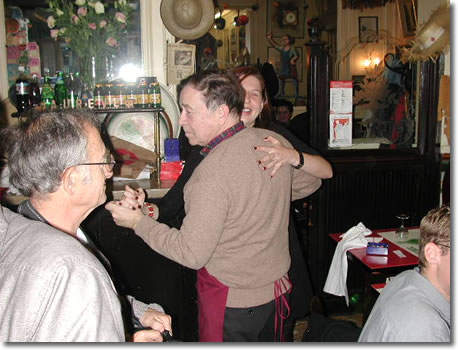
I have yet to get very interested in the high-end Paris restaurants with plates at 200E and more. I would rather donate money to victims of disasters. And I have yet to meet anyone who has actually eaten at one of those place but they do exist. Or have web sites, anyway. Someday, when I'm awfully rich and the poor ain't cold ...
"So what did you do to relax, Mister Sinatra? You seem tense?"
Well, for one thing I took intensive French so that I could quit having accidents and get the stuff I wanted without the merde. But I guess intensif is not very relaxing.
Actually, I went over to Jardin Luxembourg. I spotted it one day walking south on Boulevard Saint Michel. I had been looking for Boulevard Saint Germain but had walked right by it. I guess I was in a strolling mood. By the time I came to the gardens I knew I had made a mistake. They looked peaceful, beautiful. I put 'em on my list and came back a week later. They were not something I was going to brag about to every "Bud" or "Meg" back in the States. They were something for my private list. If Bud or Meg knew about them, fine; but I wasn't going to advertise them like a restaurant.

So it was on Friday that, rather than hit the bars, which is my usual habit in San Francisco, I hit the park. I had been a little too revved up all week on espresso, the likes of Hot Papaz, and who knows what else. A quite walk seemed in order.
If you ever need relief from the world, Luxembourg is the place to get it. I don't know if it did the same thing for Marie de Midicis when the palace that goes with it was built for her back in 1615. She had it all to herself, so I would guess that the gardens must have had the power of the "drowsy herbs." Almost four hundred years later, the effect is much the same. They are Prozac to the troubled mind; they invite an easy stroll and the relinquishing, at least for awhile, of all obligations. They are the note on your door telling would-be callers that you have "gone to the country." To the bill collector, the tax assessor, they are the blunt message: do not bother me today.
They are also beauty, which is probably integral to relaxation but not available in pill form. I headed first across the park from Saint Michel, till I came to the lake and the palace. I skirted the lake, stared at flowers on the other side, a rainbow of delicate colors, vibrant and beautiful. I looked up at the patchy sky of clouds, interspersed with blue sky, that always seems to be passing over Paris. But look up a moment later and you are amazed; it is either all blue or all gray, a gray of gathering moisture with a question mark. Rain or not? A drizzle? I don't think so. Put that umbrella away. Then blue again. Then I headed past the lake to the other side of the park.
There I came upon ponies waiting for kids to ride them. I came to an outdoor restaurant with a few people sitting in the shade. I came to old, dark-green benches that looked like they had come with the original gardens. Had Marie de Midicis sat upon them? Had she boldly eaten a peach there? Had a servant peeled a grape for her? Had she looked at the sky and felt blue but had another word for it? And there were chairs. What an idea. If you don't want to sit where the benches are located, you grab one of the many available chairs and sit wherever you feel like sitting. Most people seem to prefer under the trees, which were now turning fall colors. Some preferred the little tree- or shrubbery-enclosed "private" gardens with flowers and sculpture. The pattern seemed to be to sit facing the sculpture, which probably says something positive about the choice of sculpture in the little gardens. I did not see Napoleon there; I did not see generals or politicians. Rather, I found sculptures of Frederic Chopin, Paul Verlane, and the like. I think there was also a famous medical physician. And there was the model of the Statue of Liberty. Always these masses of metal and stone were surrounded by flowers of varied colors. At one of these sculptures, however ,I was horrified. I saw what looked like a piece of tin foil in the otherwise-immaculate bed of flowers. How could it have been missed. There were green-suited guys all over the park picking up the trash. I took a closer look. It surrounding, protectively, one individual flower, orange in color. I don't know what problem that flower was having but the gardeners were watching out for it.
There were young woman with babies in strollers. There were old couples loosening up creaky limbs. There were guys on benches, lawyers in suits or members of the Senate, which these days occupies the palace, sitting on benches smoking cigarettes and appearing to enjoy them, the smoke rising upward and bothering no one. And there were those who had positioned a chair at just the right angle for reading the newspaper or a book.
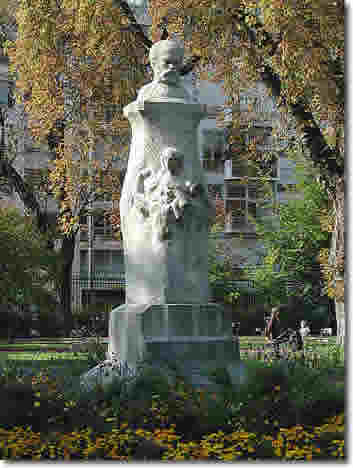
And quiet. Quiet everywhere. Street noise did not penetrate here. The sounds were probably the same sounds that Marie de Midicis heard in her gardens, the skies almost the same skies of blue and gray. I wandered around, stared at Paul Verlane—what would you think of your image here, Paul, and wouldn't it be nice to go down to Le Procope and get a drink or two or four? God only knows how you liked to drink, dear man. And what about some music with an uneven beat. Would you have liked jazz?—then I left.
It is a swell park if you need a break from the things of this world. Who doesn't?
"Louis?" I wasn't expecting the call. It was a real voice on the phone, not in my head.
I got the word. Enrico was dead. Ward Dunham called, longtime associate at Enrico's Sidewalk Cafe in North Beach. They were having a wake. But I wouldn't be back by then. But I put it on my calendar. I would go to some classy Paris sidewalk cafe and drink to the man.
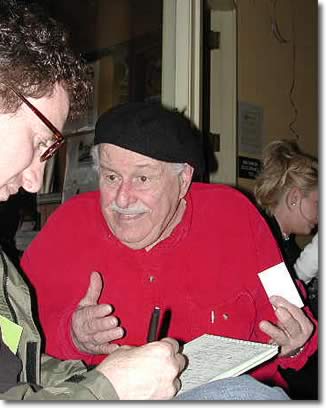
Salud, Enrico. You showed The City how. The City would not have known without you. But down it forgets as up it grows. It needed a teacher and you were its teacher. Now The City only has high prices and crooks. But what's new? It has always been that way. But then we had you to show the way. Now, at least for awhile, there is no one. Only a memory of a way, a style, something that cannot really be described but is either there or isn't, that makes life worth while and exciting and full of promise. What is it? I won't try to define it. It can't be done. It is like talking about flowers. See one, smell one but don't dissect it like a scientist. Flower are, they float out of the ground, they have faces and then having is giving and giving is ... You have come and gone the way of Ignacio Sanchez. I don't want to see the blood. Let us pour a libation of red wine all over North Beach, in Washington Square, on Lower Broadway. Let the blood of the poets run down the streets. Let sirens screams, let the maenad have their hour. Let us simmer tomatoes with basil and garlic for two days until we have a sauce that is stiff and thick as salt water taffy. Let us cook the spiralini al dente, then goop it in sauce and wash it down with red wine. Let us set a bowl aside for you with a small glass of red wine—you were not a big drinker even though you looked like one, your stomach could not handle it—and let us have silence, then music, then silence again. Let us do nothing the usual way. We refuse to be another how town.
October 9, 2007. Gone from this world. You did not look like a happy man in recent years. The world was not big enough for you. And the government took it all away. You did not have oil but you had talent and you knew talent. The government does not like those who know how to live; it hates those would make fun of Big Brother. Laugher is for children; adults pay your taxes and die. Well, you made it out before October 15, the final quarterly tax day of 2007. Can't touch you now, old boy. Thumb your nose all you want. They have no jurisdiction where you are. And bottoms up up there. Spill a little on the IRS.
He was like a deposed king walking around North Beach in recent years. He reminded me of King Lear, astounded that his daughters could treat him so miserably. Like all great men, he was a little naive too. He always thought he could make a comeback after they took it away. Age? Changed times? Maybe both. Like Lear, he retained his lordly manner but not his power. But he didn't come back. So he went to his roots. He practiced the violin, which had gotten him started. But his arm hurt him. Age, arthritis ... And he wrote his memoirs. They should be fun reading.
I had the privilege a few years back to sit in his bedroom, which also served as his office, at his niece's apartment and interview him for an article. He ranged everywhere. But he was sensitive. He would stop sometimes and ask, "What do you really want to know about?" I would say, "Did you know William Saroyan?" or "Did you know ..." Usually he did.
I heard about the original Black Cat in San Francisco, based on Le Chat Noir in Paris; I heard about how John Steinbeck used to hang out with Herb Caen at Enrico's and the deal that Steinbeck had with Caen not to "turn him in," meaning write about him in his columns. Steinbeck was rather a private person. I heard about stuff that interested me less and Enrico more, like his hiring Barbara Streisand without hearing her sing because she had "moxie." But I liked this guy. He would always stop and ask, "What do you want to know?" That's the showman checking his audience. He told me about Lennie Bruce and Mort Sahl and some rather private stuff about Lennie Bruce. He told me about Richard Brautigan shooting himself and a conversation he had had with Brautigan prior to this.
October 9, 2007. The end of an era that had probably ended some time ago. But closure. C'est fini. Now it was history. L'histoire.
"That's sad," I can hear Jen say. "But what about shopping? Did you go shopping?" Jen is all heart.
I went shopping the other day. I didn't do it for the thrill of shopping like a lot of other people. I went shopping because I needed something. I needed an ice tray. Let me explain. I have had it with going somewhere and finding there is no ice. Again and again I run into this situation. If you like cocktails, which I do, you need ice; it is essential. But I keep going places where there is no ice tray; or, if there is one, it is frozen into the freezer inside a lump of ice. I think Enrico would understand my plight. So I vowed to never travel without an ice tray.
But since I'm going shopping, why not do it in style? I had been to the Bazar de Hôtel de Ville, known as the BHV, before when I needed office supplies. But now I decided I would go back, get an ice tray, since I was told they had everything, and take a look around.
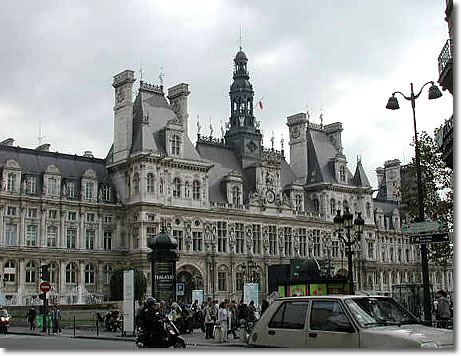
BHV is located on Rue Rivoli in Marais. It's a classy area of old Paris. The BHV is located across the street from Hôtel de Ville, or the Paris City Hall. It was built back in 1533 and restored after a fire in 1871. The BHV gets its name from Hôotel de Ville. It is the "market" of the Hôtel de Ville. The BHV dates back to 1856. Apparently there was a changed conception of shopping back then, and the BHV is supposed to be a good example of it. The same thing was occurring in the United States. Most comparable in my mind is Macy's in San Francisco. Macy's began in 1858, though on the East Coast originally.
Today the BHV and Macy's are remarkably similar. They both have six floor with satellite shops. They carry a similar range of merchandise. BHV may be a little more comprehensive. It carries office supplies, which Macy's does not. Why compete with Office Depot or nearby Staples? Every try to get office supplies in Paris? Not so easy. You go to the BHV or some other department store. Or you order online if you don't mind buying stuff sight unseen. They also have electronics at BHV, which they do not have at Macy's. But they are, all-in-all, remarkably similar. BHV perhaps has a little more glitz and is slightly more expensive. Both are located in "scenic" areas: The BHV is across from Hotel de Ville, which is absolutely spectacular and historical; Macy's in San Francisco is in Union Square, which can't quite compete with Hotel de Ville and Rue Rivoli, but Union Square is one of the classiest areas of San Francisco with history as well. There is the square itself, the Sir Francis Drake, the Westin Saint Francis, Harry' Denton's Starlite Room ...
I am easily distracted in stores, so initially I kept to business when I went in. I looked up le cuisine floor and took the elevator up to the third or the fourth floor, whatever it was on. Departing from the main floor, however, I could not help but notice all the bottles of perfume and jewelry. Had Kaitlyn been along, I think we would have halted right there. I notice the bright lights on this floor that gleamed and glittered through bottles of perfume and glanced like laser beams off the jewelry. The whole floor sparkled like the eyes of a woman in love. At Macy's the first floor is similarly devoted to perfume and jewelry but the light is softer. I never have trouble walking through it to the elevators that take me up to look at wine glasses, decanters ...
I looked for awhile without finding anything so mundane as an ice tray. Generally I make an effort to find something myself before asking for help. And I had not been able to find the French for "ice tray." I had some close words but not the exact one. But then I see an older female BHV employee who appears idle and I ask, "Avez-vous ... pour les glaçon ... plateau ..."
She walks me over to a display table just a few feet away and lifts something up. It is an ice tray. "Parfait," I say. "Merci." I feel like giving her a kiss. No damn language accident for once.
Then I look at it. It has a lid. It also has a little door in the top of the lid. It also has a price tog of 16E. For an ice tray! That is a lot. At Macy's ... But I'm not at Macy's and this must be a fancy Parisian ice tray. What do I know about Parisian ice trays. There aren't any other cheap ones—this is my only choice—so I decide I will buy it. 14E of experience, 2E of ice tray.
I go to the caisse, or cash register, and pay for it. Then I wander the store. I head up and look at lamps. Since I'm not buying one, I look at the most expensive ones. Others look at the cheaper ones. I turn my nose up a little, as if to say no such junk in my house. Then I look at double beds and luxury couches and furniture. I hang around a canapé rouge looking deep in thought. "Does it go with my Rembrandts, my Piccasos? I'm really not sure. I need my decorator ..." Then I head back down, stopping by the cuisine floor again. I look at espresso makers. The price is lower than I expect here, the top of the line only being about 650E. I have seen them for much more in San Francisco. And I have been warned many times not to compromise on price with an espresso maker. I haven't; I have never bought one. Does this mean the French are drinking bad espresso at home? I have not found the quality of French coffee what I had expected. Most of the coffee itself is "distributor" coffee—roasted, ground, and packaged who knows when—according to one coffee roasting merchant I talked with. I didn't want to be insulting but I let this person know that I was disappointed in French coffee. They agreed and sold me some fresh-roasted, fresh-ground coffee. It was better but still not up to San Francisco standards, which are probably obsessive. Without cigarettes, I think San Francisco sucks at the coffee bean like a baby at its mother tit. Suck as hard as you want, it still is not going to satisfy like a cigarette. Hence the cocktail, I think. But drink as many cocktails as you want and of the most exotic type—fresh organic juices, muddled this, muddled that, with Captain Morago's 150-proof, 19-year-old monkey rum—and you are still not going to get the satisfaction that you get from tobacco.
Anyway, I refrained from buying a cheap 650E espresso maker and descended to the women's clothing floor, where I did not feel especially comfortable and failed to notice the latest Paris styles, I'm afraid to say. One thing I have noticed, though it hardly requires going into a store to notice this, is that the style is low cut, exposed. And if that is not exposed enough, how about a net for your boobs? If Bob or Bill or Sam or Dick doesn't notice you got the goods with that, give up on the guy. He ain't going to satisfy you nohow.
I headed out of lingerie down to hardware and electronics, and you can guess where this stuff is located: dans le sous-sol, in the basement, of course. But I was pretty overdosed on merchandise at this point and just made a general check. It appeared to me that if I ever needed it, they probably had it. Good to know for future reference. I think my last departing image was that of a pair of wire strippers. I think I left my pair in a cabin in the woods somewhere, so who knows, I could be back.
"Did they really have nets?" I hear a woman ask. I ignore the question.
Since I was in the area, I headed up to Centre Georges Pompidou. It had been a long time since I had been there, over twenty years, I think. I was curious to see how it would match my memories. It took a right on Saint Martin as I headed back towards the Chatelet metro station. I don't have any recollection of Saint Martin at all but kind of like it as a I head north toward Centre Georges Pompidou. I come to the namesake church, which looks like it may be crumbling away. Later I do a web search to see if I can get some information on this church, but all I come up with is hotels in the area name Saint Martin. It seems that the web is becoming as rich in advertising as it is in information. It is a lovely walk through the narrow streets to Centre Georges Pompidou.
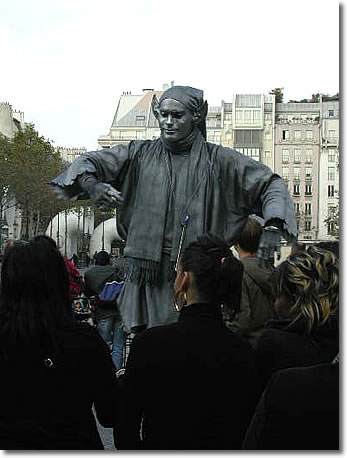
As I enter Place Georges Pompidou, I see the art center. It is as I remember it, perhaps the plaza smaller, the center larger, more looming. The big attraction of the plaza is the performances, which seem spontaneous and attract throngs of jeunes or youth. It looks a little like the 60s in San Francisco, young women with long hair braided in unusual ways, guys with long hair rather than the popular shaved head of the young Frenchman. But it is not all that free and easy going. On posts near the back of the plaza I see posted rules about performances and hours. I walk around the art center but it is Saturday and there is a long line waiting to get in. I'm actually glad about that. I didn't really want to go in, or at least not today. I retrace my path to the edge of the plaza, looking up at the center.
It center is the Musee National d'Art Moderne so I should probably watch what I say about it. It surely contains many fine works by many fine artists. Artists are a group of people that you do not want to beat up on. They don't deserve it. But I think they might deserve a better art center. It was designed about thirty years ago to look très moderne. I suppose it did back then. I guess someone thought Paris looked too old and staid and this place would liven things up. Maybe it did for awhile. But what it looks like is a children's lego set used to model a factory of the period. These days it looks more dated than anything, especially the many ship-like stacks that arise out of it and around it. It also looks like it is still under construction. If so, maybe they could take it down and replace it. In the digital age, it just seems to lack something. If you want to look "modern" now, surely you need something that looks like a chip or a software model or something of that kind. Old smoke stacks look like something "old hat" that you would find around a junk yard. But don't pay any attention to me. Hopefully the place doesn't leak and all the fine art inside is safe and secure.
Somehow shopping and Georges Pompidou left me thirsty and hungry. As I walked back down Rue Saint Martin past the old church with its many namesake hotels somewhere in the area, I came to a place that looked like it might be okay: Café Resto. There were some customers but not too many. I found a nice table in the inner courtyard of tables and sat down. A young bald-headed waiter was over almost immediately. He radiated energy and not ennui or tiredness, as so many of my other waiters had. I ordered Joliet Poulet, a salad, and glass of vin blanc. He heard blanc and not rouge. This was even better. He brought the bottle itself over to the table, a nice Chardonnay, and filled the glass to the top. Not long afterwards, a salad arrived. Well, not everything is prefect or to my liking. I think Jolie Poulet is an acquired taste. It was a chicken and vegetable salad that came as a kind of cold gelatin glob.
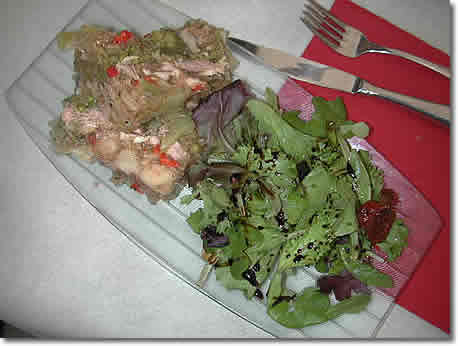
I think if you wait long enough it melts. I didn't wait. I ate about half. Positive notes: There are things on the menu that I probably would have liked, and good service was refreshing.
On Friday I dropped by the studio of Andre Martins de Barros. I didn't expect it. He was not at the easel as he usually is; he was at the computer making CDs. He complained about the slowness of the process. Beaucoup des pixels, beaucoup des pixels, Andre. Then we went into his web site.
Under Art Gallery of Paintings, you can see the variety of types that he does: The Other World, Human Conscience, Allegories, Music, Scholars, Fruits of Life, Eroticism, Clowns with Flowers, Consumerism ... We are in the back of the studio in the corner where the computer is located. People, mostly tourists, pass by the studio windows, most stopping to stare in. Andre's work are "atypical", not the expected, and are attention grabbers. It is hard not to stop and stare at a librarian ("Le Bibliothécaire") whose form is composed entirely of books.

Currently he is working on an erotic piece composed almost entirely of naked bodies. The forehead is the buttocks of a woman, the nose is the shapely back of a woman, the lips and mouth are formed by spread legs, the hair is a tangle of bodies. Thus the features of the erotic person are composed of erotic elements. Or take "Ballet for a Piano." The piano is huge, the ballerinas, who are seen doing somersaults on the keyboard, are small. Again, another type of fanciful treatment of the subject matter.
It is interesting sitting in the back of the studio. The light is dim except for the screen of the computer and the overhead flood lamp by the tall easel. There is "stuff" all over the studio. Musical instruments on the walls, books, statues, an old printing press, I think, and of course Andre's paintings, which, though imaginative and fanciful, have a look of the old masters about them. They are rich in detail, sensuous in color, and finely executed. They are "mind-benders" that are beautiful to behold.
I ask Andre if he has the complete idea of a work in mind when he begins:
"Avez-vous l'idee complete au debut?"
"Qui," says Andre. But he works on several paintings at the same time. Partly this is because of the technique he uses, which requires that the paint dries on the canvas. "So he goes from one painting to another," says his wife Andrea, who has dropped by the studio.
Andre is also a perfectionist. One might not pick that up based solely on the fanciful, imaginative nature of his work. But observing the detail, finish, and overall execution of a piece confirms it.
"Est-ce que le peinture travail difficile pour vous? Ou est-ce que suelemente le plaisir?" (Is painting hard work for you? Or is it simply pleasure?)
While many of his works have a "fun" look about them, he admits that he has difficult moments. Says Andrea, "He has to reach perfection... He likes to have everything exactly as he has it in mind." This involves concept, detail, technique, and light. All these have to be right before he is satisfied with a work. He doesn't just "abandon" pieces as some artists have been jokingly known to do. "As long as he's not satisfied, he goes on and on until he gets the satisfaction. This is perhaps the passion that goes into his work. The whimsical look of "Musical Flight" comes at a price. "Chaque fois (each time)," says Andre, there is a little battle to get what he had in mind.
He works every day of the week except dimanche (Sunday). For a guy who has a little daily battle with the world of art, he looks at home in his studio and unperturbed by the steady stream of visitors.
"So what's the score?" I hear Gen asking when I get off the plane.
"The Score?" I ask. "I don't keep score."
"Sure you do. All Americans keep score. We're competitive."
"I'm not an American any more," I say. "I'm a San Franciscan." That's in fact what I tell people when they ask where I'm from. It saves at least some of the embarrassment of saying you're from the United States and then having to apologize for the Bushman.
But she persists, at least in my imagination. So finally I give in and say:
Beautiful scene. Great backdrop of beautiful old buildings, even if you can flush the toilet paper down the toilet. Most of the time I think it's worth it, though I wouldn't mind a bidet or two. And great style of living. Just can't beat all those sidewalk cafes, bars, tobacs, brasseries, bouchons ... Food? On the mid and lower end; too much formula. And everything comes with fries, which I like but there may be a limit. I have not tried the high end, as I'm still saving up for that. But if you believe what Google dishes up, the high end must be fabulous, fabuleux. You can tell Mary and Bill that. The wine: good and cheap too. Can't beat French wine, especially the Bordeaux. Coffee? Fine if you use milk and sugar and smoke too. San Francisco has Paris beat on coffee, hands down. Cocktails. Ditto. Cheese good, no excellent. Fruit? Good but hard to beat California there. Service? Can be abominable. But if it is a bar-tobac that you frequent on any regular basis, very good. You're "one of them" and they treat you like it. Style, overall? Unbeatable. Open early, closed late, people out all the time eating, drinking, talking, and at least appearing (I take nothing for granted) having a good time. And that is maybe the most important thing. On a scale of one to ten? I won't go there. But pretty damn good.
"And would this, this Enrico fellow have liked it?"
Liked it? I think it was his model!
Home
| City Notes
| Restaurant
Guide | Galleries
| Site Map | Search
| Contact